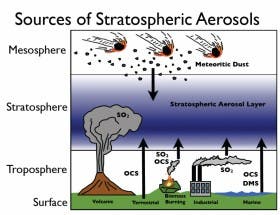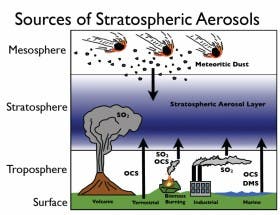According to a new study released by the National Oceanic and Atmospheric Administration (NOAA), tiny solid and liquid particles in the atmosphere, resulting from human and natural pollution, have kept the Earth from warming at the estimated level.

The aerosols, or small airborne particles, in the stratosphere cool the earth by reflecting the sunlight back into space. In the past decade, a significant increase of aerosols has been measured, although scientists aren’t certain where to pin-point the exact causes. They speculate that artificial pollution, coupled with the slew of volcanic eruptions the planet’s been having lately, might be responsible for this.
John S. Daniel, who co-authored the paper and is a research scientist at the National Oceanic and Atmospheric Administration’s Earth System Research Laboratory in Boulder, Colo., said the analysis shows the impact minor volcanic eruptions and soot from coal burning is “certainly not negligible.”
Alan Robock, a professor at Rutgers University’s Department of Environmental Sciences who specializes in analyzing volcanic activity’s climatic impact, confirms that the matters presented in the paper are faithfully consistent with the current global warming computer modeling in place.
“It makes it clear that our theory is consistent with observations,” he said. “It also means we have to fund satellites to observe the stratosphere.”
Scientists believe now that they can counteract the effects of global warming by increasing the aersols levels in the stratosphere. John Holdren, science adviser to President Barack Obama, told the Associated Press in 2009 that extreme techniques like shooting pollution particles into the stratosphere could be deployed if tipping points, such as the complete loss of summer sea ice in the Arctic, are breached.
Now, although the rate of global warming growth is slowing down, it’s still significantly larger than that found in the 90’s or 80’s. We knew from previous studies that pollution could slow global warming, and gave China’s industrial coal expenditure as a worthy example, however playing the pollution card against global warming, to me, doesn’t seem like a very viable solution. It could very easily back fire in the long run.









